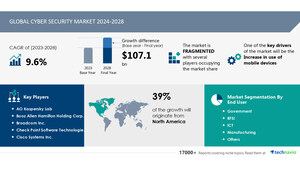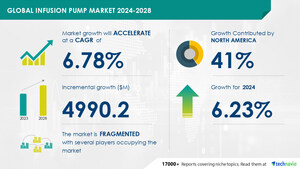NEW YORK, Oct. 21, 2024 /PRNewswire/ -- Report with market evolution powered by AI- The global utility locator market size is estimated to grow by USD 1.93 billion from 2024-2028, according to Technavio. The market is estimated to grow at a CAGR of almost 5.48% during the forecast period. Growing safety and security concerns regarding protection of underground utilities is driving market growth, with a trend towards increase in gas pipeline laying projects. However, highly complex and expensive retrofit operations poses a challenge. Key market players include 3M Co., Asian Contec Ltd., Berntsen International Inc., BLOOD HOUND LLC, Emerson Electric Co., Eos Positioning Systems Inc., Fortive Corp., Geophysical Survey Systems Inc., Guideline Geo AB, Hexagon AB, MidAmerican Technology Inc., Quanta Services Inc., RYCOM Instruments Inc., SPX Technologies Inc., STC TECHNO AC LLC, SubSurface Instruments Inc., The Toro Co., Utility Tool Co., Vermeer Corp., and Vivax Metrotech Corp..
AI-Powered Market Evolution Insights. Our comprehensive market report ready with the latest trends, growth opportunities, and strategic analysis- View your snapshot now
Forecast period |
2024-2028 |
Base Year |
2023 |
Historic Data |
2018 - 2022 |
Segment Covered |
Type (Electromagnetic field and GPR), End-user (Oil and gas, Electricity, Transportation, and Others), and Geography (North America, Europe, APAC, South America, and Middle East and Africa) |
Region Covered |
North America, Europe, APAC, South America, and Middle East and Africa |
Key companies profiled |
3M Co., Asian Contec Ltd., Berntsen International Inc., BLOOD HOUND LLC, Emerson Electric Co., Eos Positioning Systems Inc., Fortive Corp., Geophysical Survey Systems Inc., Guideline Geo AB, Hexagon AB, MidAmerican Technology Inc., Quanta Services Inc., RYCOM Instruments Inc., SPX Technologies Inc., STC TECHNO AC LLC, SubSurface Instruments Inc., The Toro Co., Utility Tool Co., Vermeer Corp., and Vivax Metrotech Corp. |
The natural gas industry's transition from traditional energy sources to piped gas for industrial and residential use has resulted in an increase in gas pipeline construction projects worldwide. For instance, the TAPI project, a 1,127-mile natural gas pipeline connecting Turkmenistan, Afghanistan, Pakistan, and India, is being revived to meet the gas demands of these countries. This growth in pipeline projects necessitates thorough studies and surveys to locate and mark underground utilities before construction to mitigate risks. Proper utility location using utility locator devices, such as magnetic and pipe and cable locators, is crucial to detect curb boxes, shut-off valves, iron pipe joints, and gas pipeline paths. The importance of utility location activities in preventing potential fatalities from natural gas explosions further underscores the significance of this market. Consequently, the global utility locator market is poised for growth due to the rising number of pipeline projects during the forecast period.
The Utility Locator Market is witnessing significant trends in the subterranean facilities sector, focusing on safety and protection. Utility locating technologies are essential for identifying and managing aging infrastructure, such as piped natural gas subsurface pipelines, water pipes, telephone lines, and non-metallic utilities. Leak detection is a critical aspect of this market, with advanced utility locators using technologically advanced tools like electromagnetic field locators and ground-penetrating radar for real-time detection of leakages. Key industries include oil and gas, electricity, transportation, and telecommunications, with 5G technology driving growth in the telecommunications sector. Stringent regulations require excavation practices to use conventional tools like electromagnetic fields and GPR for locating underground utilities before digging. Leading vendors offer equipment and services, with pricing and promotions influencing market profitability. Industry influencers prioritize comprehensive research and development to meet the demands of water shortages, food security, and groundwater resources. The market is evolving rapidly, with key participants focusing on advanced utility locators and referral services to stay competitive.
Insights on how AI is driving innovation, efficiency, and market growth- Request Sample!
- The utility locator market faces significant challenges due to high deployment costs for end-users. These costs stem from the total cost of ownership and the need for extensive worker training. Initial investments are substantial, and retrofitting and replacement work add to the expense. Utility locator devices require modifications to associated support equipment with each technological advancement, leading to additional costs and operational halts. End-users often outsource locating operations to service providers to reduce costs, decreasing demand for new utility locators and impeding market growth. Furthermore, the rapid advancement of technology in utility locator devices poses a challenge. Newer, more complex systems are expensive and may replace existing systems, potentially hindering market growth during the forecast period.
- The Utility Locator Market is facing several challenges in various industries such as telecommunications, oil and gas, electricity, transportation, and construction. Traditional tools like electromagnetic locators and ground-penetrating radar (GPR) are being replaced by advanced utility locators and innovative solutions like real-time detection and GPS-enabled Verifier. Stringent regulations require safe excavation practices, making it essential to accurately locate utility infrastructure like gas lines, water pipes, telephone lines, and electricity cables before digging. GPR technology, a key component of subsurface utility engineering, is evolving with the advent of 5G technology and high-speed rail projects. Leading vendors are investing in comprehensive research and development to offer profitable pricing, promotions, and referral services to meet the growing demand for utility locating solutions. Industry influencers are pushing for the adoption of digital technologies and geophysical methods to enhance excavation safety and prevent leakages in utility infrastructure. The telecommunications sector is a significant player in the utility locator market, with a focus on infrastructure development and network expansion. The market is expected to grow as the need for accurate and efficient utility locating solutions becomes increasingly important for infrastructure projects and construction sites. Overall, the utility locator market is witnessing significant technology evolution to meet the demands of various industries and ensure excavation safety.
Insights into how AI is reshaping industries and driving growth- Download a Sample Report
Segment Overview
This utility locator market report extensively covers market segmentation by
- Type
- 1.1 Electromagnetic field
- 1.2 GPR
- End-user
- 2.1 Oil and gas
- 2.2 Electricity
- 2.3 Transportation
- 2.4 Others
- Geography
- 3.1 North America
- 3.2 Europe
- 3.3 APAC
- 3.4 South America
- 3.5 Middle East and Africa
1.1 Electromagnetic field- The Utility Locator Market refers to the industry dedicated to identifying and mapping the locations of various utility infrastructure such as water, gas, electricity, and telecommunications lines. This market is essential for construction projects and infrastructure development, ensuring the safety and efficiency of digging operations. Companies provide utility locating services using advanced technology like ground-penetrating radar and electromagnetic locators. The market is growing due to increasing infrastructure development and stricter regulations for utility safety.
Download complimentary Sample Report to gain insights into AI's impact on market dynamics, emerging trends, and future opportunities- including forecast (2024-2028) and historic data (2018 - 2022)
Research Analysis
The utility locator market encompasses the identification and mapping of subterranean facilities, ensuring safety and protection during excavation projects. Utility locating technologies are essential for detecting and identifying underground utilities, including piped natural gas and subsurface gas pipelines, to prevent damage and potential hazards. With aging infrastructure, the need for advanced utility locators has grown, addressing concerns over water shortages and food security. Technologically advanced tools, such as electromagnetic field detectors and Ground Penetrating Radar (GPR), are increasingly used to detect utility lines in various industries, including oil and gas, electricity, transportation, and referral services. Stringent regulations require excavation practices to employ conventional tools and technologically advanced methods to minimize the risk of damage to these critical infrastructure systems. Leak detection is another crucial application of utility locating technologies, ensuring the safety and efficiency of these essential services. The evolution of technology continues to drive innovation in utility locating, improving accuracy and efficiency while addressing the challenges of safety, cost, and regulatory compliance.
Market Research Overview
The Utility Locator Market encompasses the technologies and services used to identify and locate subterranean facilities, ensuring safety and protection during excavation and construction projects. Utility locating technologies include electromagnetic field locators, ground-penetrating radar (GPR), and advanced utility locators. These tools are essential for the detection of piped natural gas, subsurface gas pipelines, water pipes, telephone lines, and other non-metallic utilities. With aging infrastructure, water shortages, food security, and groundwater resources becoming major concerns, the utility locator market is evolving rapidly. Technologically advanced tools like real-time detection systems, GPS-enabled verifiers, and innovative solutions are increasingly being adopted for subsurface utility engineering and infrastructure projects. Stringent regulations, excavation safety, and digging practices necessitate the use of utility locating services. The oil and gas, electricity, transportation, and telecommunications sectors are major consumers of these services. With the advent of 5G technology, the telecommunications sector is expected to witness significant growth in the utility locator market. Referral services and leading vendors play a crucial role in the industry, offering equipment and services to key participants. Pricing, promotions, and industry influencers also impact market profitability. Comprehensive research and development in geophysical technologies continue to drive advancements in utility locating solutions, from conventional tools to digital technologies, for high-speed rail projects and subsurface site characterizations.
Table of Contents:
1 Executive Summary
2 Market Landscape
3 Market Sizing
4 Historic Market Size
5 Five Forces Analysis
6 Market Segmentation
- Type
- Electromagnetic Field
- GPR
- End-user
- Oil And Gas
- Electricity
- Transportation
- Others
- Geography
- North America
- Europe
- APAC
- South America
- Middle East And Africa
7 Customer Landscape
8 Geographic Landscape
9 Drivers, Challenges, and Trends
10 Company Landscape
11 Company Analysis
12 Appendix
About Technavio
Technavio is a leading global technology research and advisory company. Their research and analysis focuses on emerging market trends and provides actionable insights to help businesses identify market opportunities and develop effective strategies to optimize their market positions.
With over 500 specialized analysts, Technavio's report library consists of more than 17,000 reports and counting, covering 800 technologies, spanning across 50 countries. Their client base consists of enterprises of all sizes, including more than 100 Fortune 500 companies. This growing client base relies on Technavio's comprehensive coverage, extensive research, and actionable market insights to identify opportunities in existing and potential markets and assess their competitive positions within changing market scenarios.
Contacts
Technavio Research
Jesse Maida
Media & Marketing Executive
US: +1 844 364 1100
UK: +44 203 893 3200
Email: [email protected]
Website: www.technavio.com/
SOURCE Technavio

WANT YOUR COMPANY'S NEWS FEATURED ON PRNEWSWIRE.COM?
Newsrooms &
Influencers
Digital Media
Outlets
Journalists
Opted In





Share this article